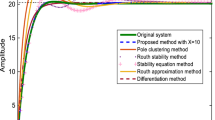Abstract
A model reduction approach is presented for discrete-time linear time-variant input-delayed systems. According to this proposed approach, a dynamical variable is constructed by taking advantage of the current state and historical information of input. It is revealed that the behavior of this dynamical variable is governed by a discrete-time linear delay-free system. It is worth noting that the presented variable transformation does not require the system matrix to be invertible. Based on the reduced delay-free models, stabilizing control laws can be easily obtained for the original delayed system. For the case with a single input delay, the constructed variable is an exact prediction for the future state, and thus the stabilizing control law could be designed by replacing the future state with its prediction. Finally, three discrete-time periodic systems with delayed input are employed to illustrate how to utilize the presented model reduction approaches.
Similar content being viewed by others
References
Moon F C. Dynamics and Chaos in Manufacturing Process. New York: Wiley, 1998
Cook J A, Powell B K. Modeling of an internal combustion engine for control analysis. IEEE Control Syst Mag, 1988, 8: 20–26
Gu K, Niculescu S I. Survey on recent results in the stability and control of time-delay systems. J Dynamic Syst Measurement Control, 2003, 125: 158–165
Richard J P. Time-delay systems: an overview of some recent advances and open problems. Automatica, 2003, 39: 1667–1694
Chen S, Xue W C, Zhong S, et al. On comparison of modified ADRCs for nonlinear uncertain systems with time delay. Sci China Inf Sci, 2018, 61: 070223
Gao S S, You X, Jia X C, et al. A new stabilizing method for linear aperiodic sampled-data systems with time delay inputs and uncertainties. Sci China Inf Sci, 2020, 63: 149203
Kwon W H, Pearson A E. Feedback stabilization of linear systems with delayed control. IEEE Trans Automat Contr, 1980, 25: 266–269
Artstein Z. Linear systems with delayed controls: a reduction. IEEE Trans Automat Contr, 1982, 27: 869–879
Manitius A, Olbrot A. Finite spectrum assignment problem for systems with delays. IEEE Trans Automat Contr, 1979, 24: 541–552
Farraa B B, Abbou R, Loiseau J J. Inventory control of a class of logistic networks. Syst Control Lett, 2021, 147: 104845
González A. Robust stabilization of linear discrete-time systems with time-varying input delay. Automatica, 2013, 49: 2919–2922
Santos T L M. Modified artstein predictor for LTI systems with dead time and unkown disturbances. J Control Autom Electr Syst, 2016, 27: 263–273
Moon Y S, Park P G, Kwon W H. Robust stabilization of uncertain input-delayed systems using reduction method. Automatica, 2001, 37: 307–312
Yue D, Han Q L. Delayed feedback control of uncertain systems with time-varying input delay. Automatica, 2005, 41: 233–240
Yue D. Robust stabilization of uncertain systems with unknown input delay. Automatica, 2004, 40: 331–336
Chen W H, Zheng W X. On improved robust stabilization of uncertain systems with unknown input delay. Automatica, 2006, 42: 1067–1072
Jankovic M. Recursive predictor design for state and output feedback controllers for linear time delay systems. Automatica, 2010, 46: 510–517
Zhou B, Li Z Y, Lin Z. Stabilization of discrete-time systems with multiple actuator delays and saturations. IEEE Trans Circuits Syst I, 2013, 60: 389–400
Zhou B. Observer-based output feedback control of discrete-time linear systems with input and output delays. Int J Control, 2014, 87: 2252–2272
Wang Y, Wu A-G. Prediction schemes for disturbance attenuation of discrete-time linear systems with delayed input and delay-free input. Intl J Robust Nonlinear, 2022, 32: 5574–5599
Mazenc F, Malisoff M, Niculescu S I. Reduction model approach for linear time-varying systems with delays. IEEE Trans Automat Contr, 2014, 59: 2068–2082
Mazenc F, Malisoff M. Reduction model approach for linear time-varying systems with input delays based on extensions of Floquet theory. Syst Control Lett, 2016, 94: 70–76
Mondié S, Michiels W. Finite spectrum assignment of unstable time-delay systems with a safe implementation. IEEE Trans Automat Contr, 2003, 48: 2207–2212
Léchappé V, Moulay E, Plestan F. Prediction-based control for LTI systems with uncertain time-varying delays and partial state knowledge. Int J Control, 2018, 91: 1403–1414
Tsubakino D, Krstic M, Oliveira T R. Exact predictor feedbacks for multi-input LTI systems with distinct input delays. Automatica, 2016, 71: 143–150
Kong S J, Bresch-Pietri D. Prediction-based controller for linear systems with stochastic input delay. Automatica, 2022, 138: 110149
Lozano R, Castillo P, Garcia P, et al. Robust prediction-based control for unstable delay systems: application to the yaw control of a mini-helicopter. Automatica, 2004, 40: 603–612
Duan G-R. Linear Systems Theory (in Chinese). Beijing: Science Press, 2016
Zhou B. Truncated Predictor Feedback for Time-Delay Systems. Berlin: Springer-Verlag, 2014
Wu A-G, Wang Y. Prediction schemes for disturbance attenuation of discrete-time linear systems with input-delay. Intl J Robust Nonlinear, 2021, 31: 772–786
de Souza C E, Trofino A. An LMI approach to stabilization of linear discrete-time periodic systems. Int J Control, 2000, 73: 696–703
Acknowledgements
This work was supported by Shenzhen Science and Technology Program (Grant Nos. RCJC20210609104400005, KQTD20210811090146075), HIT Wuhu Robot Technology Research Institute (Grant No. HIT-CXY-CMP2-IARU-21-01), Science Center Program of National Natural Science Foundation of China (Grant No. 62188101), National Natural Science Foundation of China (Grant No. 62173112), and Joint Funds of the National Natural Science Foundation of China (Grant No. U2013203).
Author information
Authors and Affiliations
Corresponding author
Rights and permissions
About this article
Cite this article
Wu, AG., Duan, GR., Wang, Y. et al. A model reduction approach for discrete-time linear time-variant systems with delayed inputs. Sci. China Inf. Sci. 67, 142201 (2024). https://doi.org/10.1007/s11432-022-3766-3
Received:
Revised:
Accepted:
Published:
DOI: https://doi.org/10.1007/s11432-022-3766-3




